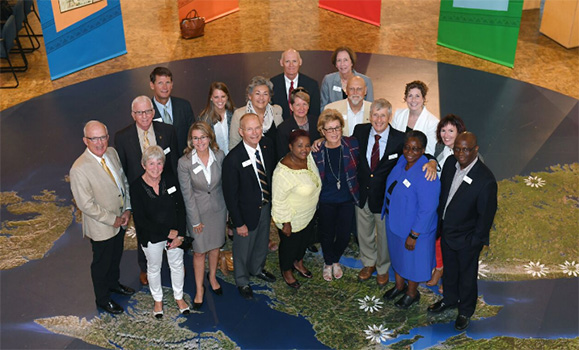The Faculties of Dentistry, Medicine and Health Professions welcomed representatives and board members of the Johnson Scholarship Foundation to Halifax and Īꔄtv on Monday, September 12 to celebrate the partnership between the foundation and Dal as well as the parties‚Äô five-year agreement.
The Johnson Scholarship Foundation is based in Florida, but has many ties to Nova Scotia. to help Indigenous and Black Nova Scotian students pursue studies in health care through pathways programs. It committed to match up to $1 million in donations to Dal over five years.
Learn more:
The visit to campus was an opportunity for Dal to showcase the achievements of the past year, its plans for the future and to thank the Johnson Scholarship Foundation for its support.
Under sunny skies, Monday‚Äôs visit kicked off with a bus tour. Barbara Hamilton-Hinch, assistant professor in the Īꔄtv School of Health and Human Performance and tour guide for the trip, explained the history of African and Indigenous peoples in Nova Scotia and pointed out significant landmarks in Halifax, Dartmouth, North Preston, East Preston and Cherry Brook.
Commenting on the lack of services and educational opportunities that have frequently hampered Black and Indigenous Nova Scotians from pursuing studies in the health professions, Hamilton-Hinch stressed the need for more African Nova Scotian and Indigenous doctors, dentists, nurses, and other healthcare professionals to inspire young people. ‚ÄúIf you can see it, you can be it,‚ÄĚ she said.
Supporting communities
Over lunch at the Collaborative Health Education Building (CHEB), managing director of the Aboriginal Health Sciences Initiative (AHSI) Kara Paul, and Michelle Patrick, manager of Promoting Leadership in Health for African Nova Scotians (PLANS), spoke of their work to recruit and retain more health professions students at Dal and their efforts to expand the reach of their programs.
Paul said that she devoted a lot of time to fostering community connections through Mawi’omi or community gatherings. In communities where going to university has not previously been a priority, building those links is vital, as is talking to students while they are young.
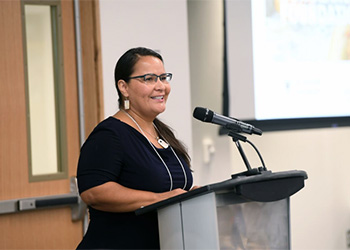 ‚ÄúWe work to create connections with communities and young people, and then support those students at Dal with academic advising, safe spaces, and by advocating for them,‚ÄĚ said Paul.
‚ÄúWe work to create connections with communities and young people, and then support those students at Dal with academic advising, safe spaces, and by advocating for them,‚ÄĚ said Paul.
Through her recruitment efforts, Paul said that she had made contact with over 5,000 potential students, and over 100 students have attended the Aboriginal Health Sciences Junior University. This summer camp program, now in its fifth year, brings Indigenous junior high and high school students (grades 8-11) to Dal for a week of experiential learning in the different health professions, including nursing, dentistry, physiotherapy, and medicine.
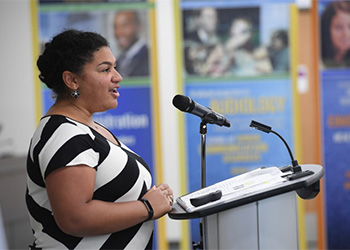 Like Paul, Patrick talked about the role of families and communities in influencing education decisions among youth. ‚ÄúIt‚Äôs important to be present at school visits and community information sessions and to help students see themselves in the university classroom.‚ÄĚ
Like Paul, Patrick talked about the role of families and communities in influencing education decisions among youth. ‚ÄúIt‚Äôs important to be present at school visits and community information sessions and to help students see themselves in the university classroom.‚ÄĚ
Over 1,200 students have heard about or had some involvement with PLANS said Patrick, with involvement in the summer camps growing each of the three years they have been held ‚ÄĒ from 15 students and two counsellors in 2014 to 40 students and five counsellors in 2016.
For the first time, a camp was held in Cape Breton this summer in conjunction with Cape Breton University and the Nova Scotia Community College to make young people aware of educational options in nursing, nutrition, public health, LPN/CCA and therapeutic recreation.
‚ÄúWe are reaching more young people through the camps,‚ÄĚ she said, ‚Äúwhich give them the opportunity to see themselves as university students and potential health-care professionals. At the same time, we are increasing the leadership and mentoring opportunities for African Nova Scotian students by hiring them as counsellors.‚ÄĚ ¬†
A chance to discover
Two current Dal students spoke about how the summer camps helped them. Second-year nursing student Dominique Parsons is an African Nova Scotian from Dartmouth who attended a PLANS camp in 2014. ‚ÄúNo one in my family had gone to university,‚ÄĚ she said. ‚ÄúThe camp gave me a chance to visit labs, meet professors and get a better idea of the program. It was a unique experience to have.‚ÄĚ
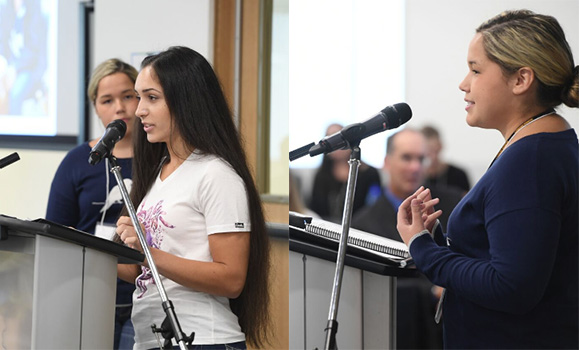
Karlee Johnson is a third-year medical sciences student from Eskasoni. She attended AHSI Junior University in 2012 and came to Dal in 2014. ‚ÄúJunior University gave me an insight into the field of science and the different health-related options, such as kinesiology, dentistry, medicine and the health professions, and I was advised to get good grades and volunteer.‚ÄĚ Her goal is to become a doctor.
The relationship between Dal and the Johnson Scholarship Foundation began eight years ago when the Johnson Foundation Bursary was created at Dal to help support students with disabilities. Quenta Adams, director of advising and access services at Dal, talked about the difference the bursaries have made and said that the growth in the number of 2016 graduates who self-identified as having disabilities had increased 34 per cent over the previous year.
‚ÄúReducing or eliminating financial barriers helps students focus on their studies, which facilitates achievement,‚ÄĚ she said. ‚ÄúThey are better able to set and reach their goals.‚ÄĚ
Dr. Tom Boran, dean of the Faculty of Dentistry, thanked the Johnson Scholarship Foundation for its gift to the faculties, which is already making an impact. ‚ÄúYou planted the seeds,‚ÄĚ he said, ‚Äúnow see the flowers that bloom.‚ÄĚ
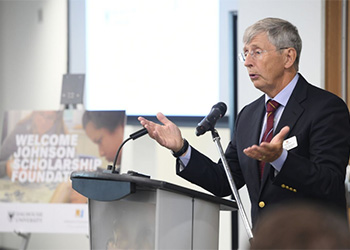 Johnson Scholarship foundation president and CEO Malcolm MacLeod thanked all the participants for their updates. ‚ÄúWe make the investment, but you‚Äôre doing the work,‚ÄĚ he said. ‚ÄúThere are problems in our society, but these are not intractable problems. There are solutions and we are moving forward. We are delighted to invest and we‚Äôll be back. In the meantime, keep going!‚ÄĚ
Johnson Scholarship foundation president and CEO Malcolm MacLeod thanked all the participants for their updates. ‚ÄúWe make the investment, but you‚Äôre doing the work,‚ÄĚ he said. ‚ÄúThere are problems in our society, but these are not intractable problems. There are solutions and we are moving forward. We are delighted to invest and we‚Äôll be back. In the meantime, keep going!‚ÄĚ
The Johnson Scholarship Foundation will match up to $1m over the five-year partnership. Dal’s objective is to raise $200,000 each year. For more information on the project, .
